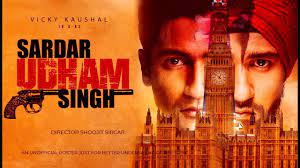During our childhood, every weekend, we used to wait for actor-director Dheeraj Kumar’s Kahan Gaye Woh Log on Doordarshan as the series introduced or refreshed memories about lesser-known freedom fighters, who were not celebrated twice every year, but whose contribution to India’s independence was no less. Watching Shoojit Sircar’s well-crafted story of Udham Singh makes you ask the same question: where are those patriots?
Like an elephant, Udham nurses a grudge against the colonial empire for killing and injuring more than a thousand innocent Indians in Jallianwala Bagh. He suffers but keeps the fire burning and — almost 21 years after the massacre — shoots down Michael O’ Dwyer, the governor of Punjab, who had ordered General Dyer to punish the peaceful protesters in London during a public event.
He is sentenced to death, but his trial raises important questions about the distinction between a revolutionary and a terrorist, murder as a tool of protest, the use of Section 144, and went on to expose the Empire to the world. Thousands of Indian soldiers sacrificed their lives for the Empire during the First World War, but O’ Dwyer still wanted to teach peaceful protesters at the Jallianwala Bagh a lesson.
Director Shoojit Sircar explores contentious definitions and concerns, as India continues to grapple with the idea of dissent, and Section 144 remains a questionable, repressive tool in the hands of the government of the day.
A potent blend of reason and emotion, Shoojit doesn’t look at the past from a lens tinted with unqualified devotion. Without making a show of it, he digs into the meaning of Udham’s actions. Just like how the alias Ram Mohammad Singh Azad that Udham gave for the trial, became a statement in itself against the divide and rule policy of the British, comes through a dialogue between a British investigative officer and his superior.
sardar uddam…
- Director: Shoojit Sircar
- Cast: Vicky Koushal, Amol Parashar, Shaun Scott, Banita Sandhu, Stephen Hogan
- Duration: 162 minutes
- Storyline: The undeterred mission of Sardar Udham Singh to avenge the lives of his beloved brethren, who were ruthlessly murdered in the Jallianwala Bagh Massacre of 1919
In the patriotic space, dialogues tend to get didactic, but Ritesh Shah refrains from long-winded monologues and keeps the tone youthful and realistic, as he, along with Shubhendu Bhattacharya, sprinkles the screenplay with both the idealistic and romantic sides of Udham. The man who swore by absolute freedom took the customary court oath on Heer Ranjha.
The British characters also don’t come across as black cardboards. They are persuasive in defending the “white man’s burden” which Udham describes as an evil design of the Empire to loot India. They may have been fictionalised, but some of the best moments come through during the conversations between O’ Dwyer and Udham when the latter worked as his aide. They provide an insight into what the British rulers thought of Indians in general.
The production design and cinematography team have recreated the period with diligence, succeeding in transporting us to the times when the world was gradually slipping towards another World War.
Vicky Kaushal in a still from the film
Above all, the non-linear editing makes the content all the more compelling, hiding the gaps in the material available on Udham. The idea of putting the action part before the motivation keeps the audience engaged. Known for his penchant for detail, Shoojit has picturised the heartbreaking Jallianwala Bagh episode with a microscope. It provides a foundation for Udham’s anguish. The sequence where Udham holds a wounded Sikh on his shoulder, with his kesh(long hair) flowing against the dim light, leaves you with a big lump in the throat long after the credits roll. The almost 30-minute long depiction of the massacre and its aftermath is perhaps the most moving depiction of human misery, after Govind Nihalani’s Tamas.
On the flip side, while the British response to Udham has been depicted in great detail, the Indian political leadership’s response to his act has been completely ignored. The Congress’ reaction to Udham Singh’s case has been kept out. The influential V.K. Krishna Menon who represented him in the court, along with John Hutchinson, has been kept out of the frame.
Vicky Kaushal embodies the pride and pain of a revolutionary without going overboard. He oozes the confidence of a freedom fighter who can’t be broken by relentless torture and turns out to be the right choice for a role that was originally imagined for Irrfan. The broken English does irritate at times, but his malleable body language and evocative eye movement make up for it.
As Bhagat Singh, Amol Parashar looks the part in close-ups, but unlike Vicky, his effort shows in making the revolutionary look cool and happening. The strong English support cast led by Shaun Scott and Stephen Hogan makes it a wholesome experience.


















